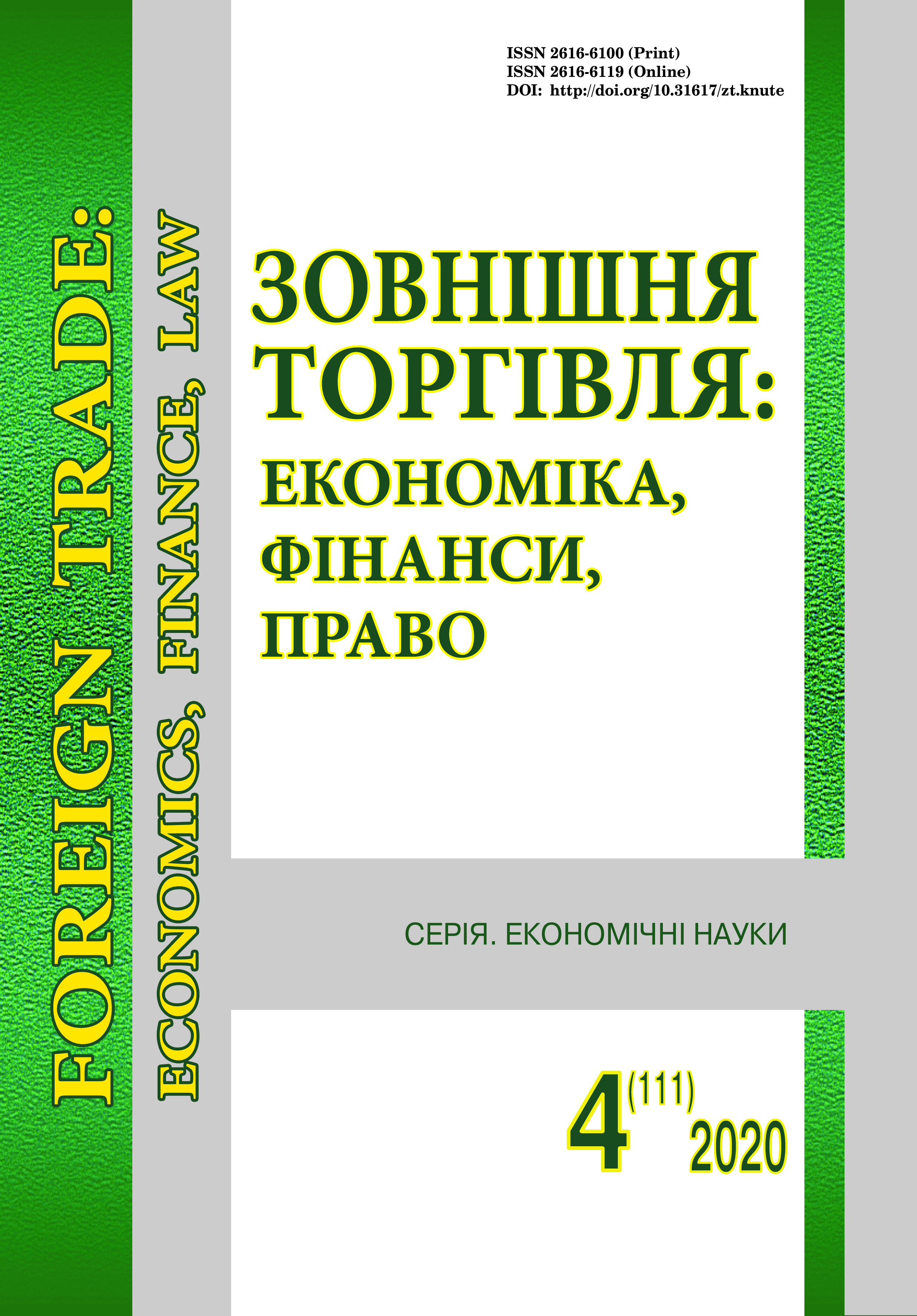«Economic breakthrough» policy: Chile experience
DOI:
https://doi.org/10.31617/zt.knute.2020(111)03Keywords:
breakthrough economy, Chilean economic miracle, «Chicago guys», trade liberalization, military dictatorship.Abstract
Background. The development and implementation of structural reforms and stabilization programs is one of the central problems of modern economic theory and practice, the research of which is relevant in the current conditions of forming a long-term strategy for the development of our country. Therefore, the study of the peculiarities of the implementation of Chile's «economic breakthrough» policy is relevant to justify the need to move to the principles of sustainable development.
Analysis of recent research and publications has shown that, despite the existence of some scientific findings, the issue of identifying the conditions and appropriate actions of the authorities that helped make the economic breakthrough in Chile, which has long remained an outsider in the world economy, remains unresolved.
The aim of the article is to study the processes of formation of a new economic mechanism in Chile, to analyze the effectiveness of application of the «economic breakthrough» policy and the possibility of its application in Ukraine.
Materials and methods. The research was conducted using the methods of theoretical generalization and analysis. The information base is the works of leading world scientists, statistical sources and Internet resources.
Results. The main stages of the implementation of economic reforms in Chile have been identified, according to the results of which in the second decade of the 21st century, the country's economy has come to be considered one of South America's most stable one. It is determined that the economic policy of the state has undergone significant changes, namely the transformation of export-oriented industries through the introduction of higher-level technologies, the deepening of the level of raw materials processing, as well as the use of more skilled workforce. The synergistic effect of these changes has contributed to the transformation of social and innovation policies.
Conclusion. The study of the nature and features of implementing the «economic breakthrough» policy in Chile allows us to conclude that it is impossible to transfer all methods of Chilean economic reforms to Ukraine. However, the Chilean model of innovative development is attractive for the agricultural regions of Ukraine, where value chains are created on the initiative of the agro-processing plants themselves. On the other hand, the raw material orientation of the country's economy is dangerous in the conditions of a turbulent functioning of world markets. According to Chilean experience, it is currently necessary for Ukraine's economy to develop knowledge-intensive enterprises due to the currently profitable industries.
References
Ahumada, J. M. (2019). Conclusions: The Mirages of the Miracle. In The Political Economy of Peripheral Growth, Palgrave Macmillan, Cham, (pp. 229-240) [in English]. https://doi.org/10.1007/978-3-030-10743-7_8
Basu, D., & Miroshnik, V. (2016). Chilean Revolution. In Structural Revolution in International Business Architecture. London: Palgrave Macmillan, (pp. 41-49). [in English]. https://doi.org/10.1057/9781137535788_4
Lebdioui, A. (2019). Chile's export diversification since 1960: A free market miracle or mirage? Development and Change, 50 (6), 1624-1663 [in English]. https://doi.org/10.1111/dech.12545
Soto, G. G. (2019). Neoliberalism as a capitalist revolution in Chile: Antecedents and irreversibility. PSL Quarterly Review, 72(289), [in English].
Bjel's'ka, O. I. (2013). Bjudzhetuvannja, orijentovane na rezul'tat: chylijs'kyj dosvid [Result-oriented budgeting: the Chilean experience]. Ekonomika ta derzhava – Economy and state, 4, 75-78 [in Ukrainian].
Kazakova, N. A. (2018). Opyt Chili dlja Ukrainy na sovremennom jetape [Chile experience for Ukraine at the present stage]. Visnyk Harkivs'kogo nacional'nogo universytetu imeni V. N. Karazina. Mizhnarodni vidnosyny. Ekonomika. Krai'noznavstvo. Turyzm – Bulletin of V. N. Karazin Kharkiv National University. Series: International Relations. Economics. Regional geography. Tourism, 7, 41-47 [in Ukrainian].
Chile staggers towards a new constitution. The Economist. Retrieved from https://www.economist.com/the-americas/2019/11/21/chile-staggers-towards-a-new-constitution [in English].
World Bank Group – International Development. Retrieved from https://www.worldbank.org [in English].
Chile staggers towards a new constitution. The Economist. Retrieved from https://www.economist.com/the-americas/2019/11/21/chile-staggers-towards-a-new-constitution [in English].
Fink, C., Hall, B. H., & Helmers, C. (2018). Intellectual property use in middle income countries: the case of Chile (No. w24348). National Bureau of Economic Research [in English]. https://doi.org/10.3386/w24348
Albuja, J. A., & Merino, L. J. (2017). Analysis of the Competitive Factors of Businesses in Chile. Espacios, 38 (29) [in English].
Easterly, W. (2001). The elusive quest for growth: Economists’ adventures and misadventures in the tropics. Cambridge, Massachusetts; London, England: The MIT Press. [in English].
Additional Files
Published
How to Cite
Issue
Section
License
Copyright (c) 2022 Foreign trade: Economics, Finance, Law

This work is licensed under a Creative Commons Attribution 4.0 International License.
This work is licensed under a Creative Commons Attribution 4.0 International (CC BY 4.0)







